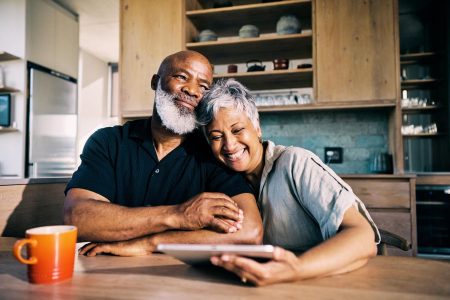By Barbra Williams Cosentino, Next Avenue
The only time I was ever aware of shopping compulsively was at the beginning of the pandemic, when everyone I knew was frantically stocking up on toilet paper, hand sanitizer and Clorox
CLX
Back home, I’d continue my safe but stultifying routine — do some work, have a bite to eat, browse the internet and do a little online shopping. What else was there?
I love to shop, but I am not what people might refer to as a “shopaholic.” Normally, I buy what I need, although occasionally I buy what I want even when I don’t need it. (Does anybody really need five pairs of sandals?)
Sometimes I shop when I’m in the mood for a little splurge (a new camisole or fancy cakes of verbena-scented soaps), or when I impulsively fall in love with something I see, such as the bronze figurine that now sits on the table in my hallway.
Sometimes I shop to cheer myself up when I’m bored or feeling sorry for myself. I know when to shop, but, more importantly, I know when to stop.
But for an estimated 5.8% of people in the United States — about 80% of whom are women, according to research published in the scientific journal World Psychiatry — compulsive shopping, also called compulsive buying disorder, shopping addiction and oniomania (from the Greek word onios meaning “for sale”) is anything but a joke. It’s a serious problem that can affect sufferers’ moods, relationships, quality of life and present and future financial security.
Compulsive Buying Disorder (CBD) symptoms include:
- Constant preoccupation with shopping and intense cravings to shop.
- Buying things you don’t need.
- Feeling guilt or shame.
- Being unable to curb spending even when you are trying.
- Feeling high or euphoric when you’ve bought new things.
- Hiding purchased items from family and friends because of guilt.
- Financial ramifications such as being in debt, having maxed out credit cards or having difficulty meeting normal monthly expenses.
Understanding the Disorder
Problematic shopping behaviors have been variously described as impulse-control disorders, addictions or obsessive-compulsive disorder (OCD). Dr. Elias Aboujaoude, director of the OCD Clinic and the Impulse Control Disorders Clinic at Stanford University, says that while CBD has long been considered to be on the obsessive-compulsive spectrum, “clinically, it fits into what we call a behavioral addiction.”
These addictions, such as gambling, internet addiction and exercise addiction, share similarities with addiction to substances such as drugs or alcohol, with impulsivity and lack of inhibition being common features of both.
Engaging in these activities reduces negative affective (mood) states while creating positive feelings and a rush of excitement. The transmission of dopamine, a neurochemical involved in the brain’s reward system which drives our behavior toward pleasurable stimuli, is increased as a result, setting up a cyclical desire to do more of the same to keep feeling good.
“Our best data in terms of dopamine and behavioral addictions comes from video gaming and gambling,” Aboujaoude says. “We have some idea that it may be involved in CBD but the research is still too primitive to make a definitive link.”
Experts say the ease of e-shopping has increased the number of people with compulsive buying disorder over the past 20 years. The growth of work-from-home jobs since the start of the pandemic gave many people the freedom and flexibility to work when they want, exercise when they want and, yes, to shop when they want.
Access Makes the Difference
“Research suggests that the rate of Compulsive Buying Disorder is higher among those who shop exclusively or primarily online as opposed to those who use brick-and-mortar stores,” Aboujaoude says. “If people have to drive to a store to purchase something, the intense urge to buy may dissipate before they get there, whereas online shopping allows for immediate gratification and makes it more likely that the urge will be satisfied. Access makes all the difference.”
Although people with CBD may live in houses overflowing with their “stuff,” the condition differs from hoarding. Hoarders’ main motivation to buy and keep things is their conviction that they may need them someday. With CBD, the urge to buy is hard to resist and the act of shopping is pleasurable in the moment, although guilt, self-reproach and shame often kick in soon after.
There is some evidence that compulsive shopping behavior may be linked to low self-esteem. It is also frequently associated with co-occurring mental health conditions such as anxiety or depression.
Fight the “Shop ’til You Drop” Compulsion
A psychologist and consultant to wealthy families, James Grubman, Ph.D., of Family Wealth Consulting, says that clients who overspend present one of the greatest challenges for financial advisors.
He says the Stages-of-Change Model, originally developed for addictions, may be useful in debt counseling. It is also helpful for people who are aware that their shopping is a problem and want to try to change their behavior on their own.
The model has five stages:
Pre-contemplation. You are not yet considering changing problematic behaviors and may not even fully realize the consequences of your behavior.
Contemplation. You have acknowledged the problem but ambivalence, conflicted emotions or uncertainty about making changes are present.
Preparation. You feel ready to take small steps forward and make statements confirming a commitment to change.
Action. You have developed clear plans for change and some steps moving towards goals are being implemented.
Maintenance. You have maintained changes for at least six months. Your coping skills and support systems are firmly in place and you are strongly committed to maintaining changes.
Some add the unofficial sixth stage: relapse, a common pitfall in the change-making process marked by a return to old behaviors and feelings of shame, self-reproach and failure. If this happens, it is important to reach out to your support system and get back on track quickly.
Managing Your CBD
Self-help steps to manage CBD include destroying credit cards and digitally stored credit card numbers, and paying for needed items with cash, check or debit cards.
To reduce impulse purchases, make it more difficult to gain access to your money. Avoid online shopping sites and TV shopping channels. Learn what your triggers are for impulsive buying or spending more money than you intended once you are shopping.
Try to note how you feel before you begin a shopping cycle — are you lonely or isolated? Angry? Deprived? Learning self-soothing strategies can help, as can learning to meet your needs in healthy ways.
If self-help measures aren’t working, try Cognitive Behavior Therapy with a qualified and licensed psychologist. Group therapy can help, as can Debtors Anonymous, a free, 12-step problem for spenders with a spending addiction.
Do SSRIs Help? Maybe
Some clinicians and researchers say prescription medications such as Prozac, Celexa or other selective serotonin uptake inhibitors can be helpful in curbing the intense urge to overbuy, but Aboujaoude is skeptical. “The jury is still out on this,” he says.
However, he adds that antidepressants, antianxiety agents or mood stabilizers may be warranted if there is evidence of severe clinical depression, anxiety or bipolar disorder.
“The odds of going to the store for a loaf of bread and coming out with only a loaf of bread are 3 billion to one,” the American humorist Erma Bombeck once wrote. Impulse shopping and even compulsive shopping can, at times, happen to all of us.
Stores and e-shops are full of wonderful, enticing things that we “know” we need to be happy. But happiness doesn’t come in a box or a bag, so curb that impulse and go for a walk instead. Walking is free, and sometimes, on a bright and beautiful autumn day, it feels as good as a stroll around the mall.
Well, almost . . .
Read the full article here









